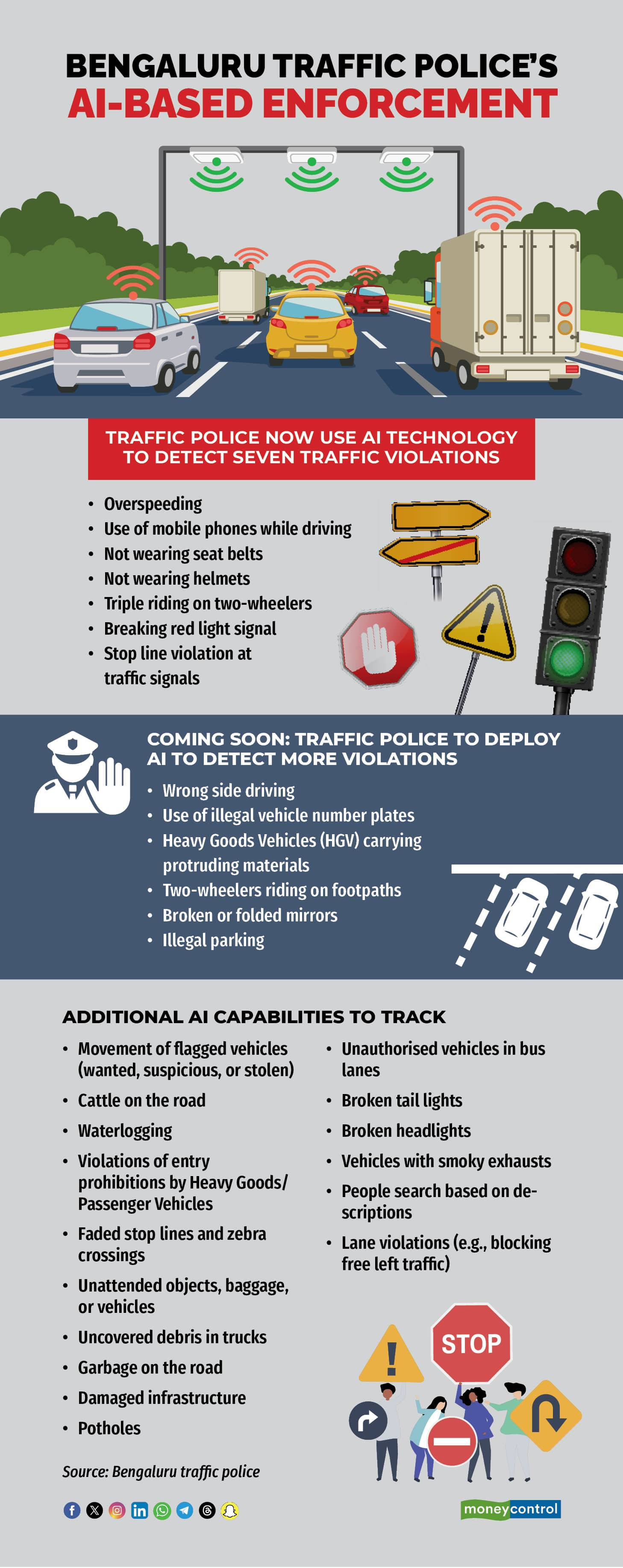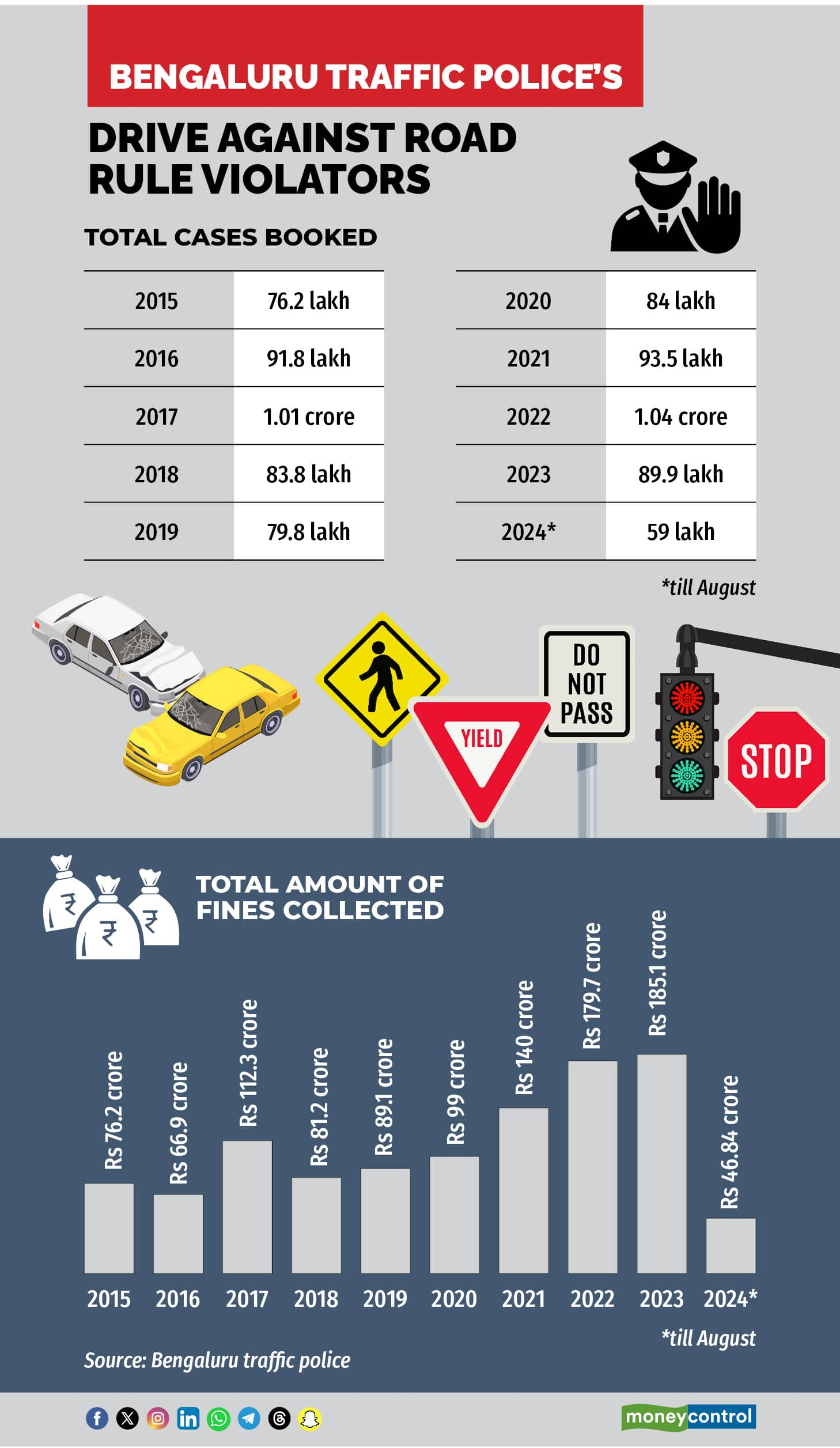



The traffic police in tech capital Bengaluru is keeping an eye on errant motorists through AI, and has decided to expand the AI-based enforcement system to detect 13 different violations, up from the existing seven.
Joint commissioner of police (Bengaluru city traffic) MN Anucheth told Moneycontrol: “At present, we use AI-based cameras to enforce seven violations: over speeding, using mobile phones while driving, not wearing seat belts, not wearing helmets, triple riding on two-wheelers, red light violations, and stop line violations.”
He said they will soon use AI to enable the booking of up to 13 violations at a time, focusing on six additional violations, including wrong-side driving, the use of illegal number plates, goods vehicles carrying materials protruding beyond the body frame, broken or folded door mirrors, and illegal parking.

The traffic police in the city is among the pioneers in using AI for traffic enforcement. In 2023 alone, 97 percent of traffic violation cases (87.4 lakh out of 90 lakh) were booked through contactless mode. The city has a 14,000 km road network, a population of 14 million, 12 million registered vehicles, and 40,000 traffic intersections.
This means the number of traffic violation cases and the fines collected are also likely to increase. In 2023 alone, Bengaluru Traffic Police booked 89.9 lakh cases and collected a record Rs 185.1 crore in fines from errant motorists.
Also read: Bengaluru now books 96% traffic violations through AI-powered cameras
Karnataka Road Development Corporation Limited (KRDCL), on behalf of the Traffic Police, recently floated a tender for 250 AI-based automatic violation detection licences. The project, which is executed under the Bengaluru City Road Safety and Traffic Management Project, will be finalised soon.
At present, Bengaluru Traffic Police has deployed 330 AI-based cameras at 50 junctions. KRDCL has also invited tenders for remote number plate detection and automatic number plate recognition for automated contactless traffic enforcement at 25 more locations.
“We will use 9,000 cameras, which are being installed under the Safe City project. Of the 9,000, 7,500 cameras have already been installed, and the remaining 1,500 cameras will be installed by December.” said Anucheth.
The traffic arm will also have access to 4,600 body-worn cameras, 200 dashboard cameras and cameras on mobile phones carried by its personnel.
“Instead of procuring additional cameras, we decided to obtain AI-based automatic violation detection licences to utilise our existing infrastructure for traffic enforcement and management," the joint commissioner said.
Anucheth said they are using AI not only for enforcement but also for traffic management. “For instance, AI cameras will detect factors affecting traffic, such as cattle on the road and waterlogging. It has an Automatic Traffic Counting and Classification (ATCC) feature which gives the type of vehicles—two-wheelers, three-wheelers, four-wheelers (cars, jeeps, vans), and trucks and buses. This helps us police understand junction-wise congestion levels and patterns for traffic management."

AI's detection capabilities
The AI-equipped system will have comprehensive detection capabilities, including identifying whether drivers or passengers in any type of vehicle are spitting on the road and automatically generating a challan. The system will also detect littered areas on roads, footpaths and grounds., apart from identifying potholes from raw video feeds and detecting areas of waterlogging. It will monitor vehicle counts, categorising them by type across city junctions for detailed analysis. Further, the system will identify any unattended objects or vehicles in the city.
"We will have the flexibility to choose the types of violations to be booked and also to select a particular junction or road," Anucheth said.
The AI-based system automatically detects a vehicle in the camera view using video detection, activates licence plate recognition and automatically generates a challan. It will also process video feeds from various sources, including surveillance cameras, body-worn cameras, feeds from different public or private cameras, and social media. The Automatic Number Plate Recognition System will monitor vehicle flow by detecting and reading number plates in real time, generating alerts based on vehicle status. It will integrate with the Bengaluru Traffic Police's databases.
Officials said they will monitor overspeeding on major arterial roads, including the Electronics City Elevated Expressway, Mysuru Road to Goraguntepalya, Airport Elevated Road (Bellary Road), Inner Ring Road from Indiranagar to Koramangala, KR Market Elevated Road, Tumakuru Road Elevated Corridor, Outer Ring Road (Goraguntepalya to Hebbal), and ORR (Hebbal to Tin Factory).
KRDCL has also floated another tender for automated traffic signals at 50 new junctions. It has also floated tenders to maintain the existing 339 manual traffic signal lights and 33 adaptive traffic signal lights.
Also read: MC Interview: Bengaluru's techie-turned-traffic chief bets on AI to ease congestion

Discover the latest Business News, Sensex, and Nifty updates. Obtain Personal Finance insights, tax queries, and expert opinions on Moneycontrol or download the Moneycontrol App to stay updated!
Find the best of Al News in one place, specially curated for you every weekend.
Stay on top of the latest tech trends and biggest startup news.